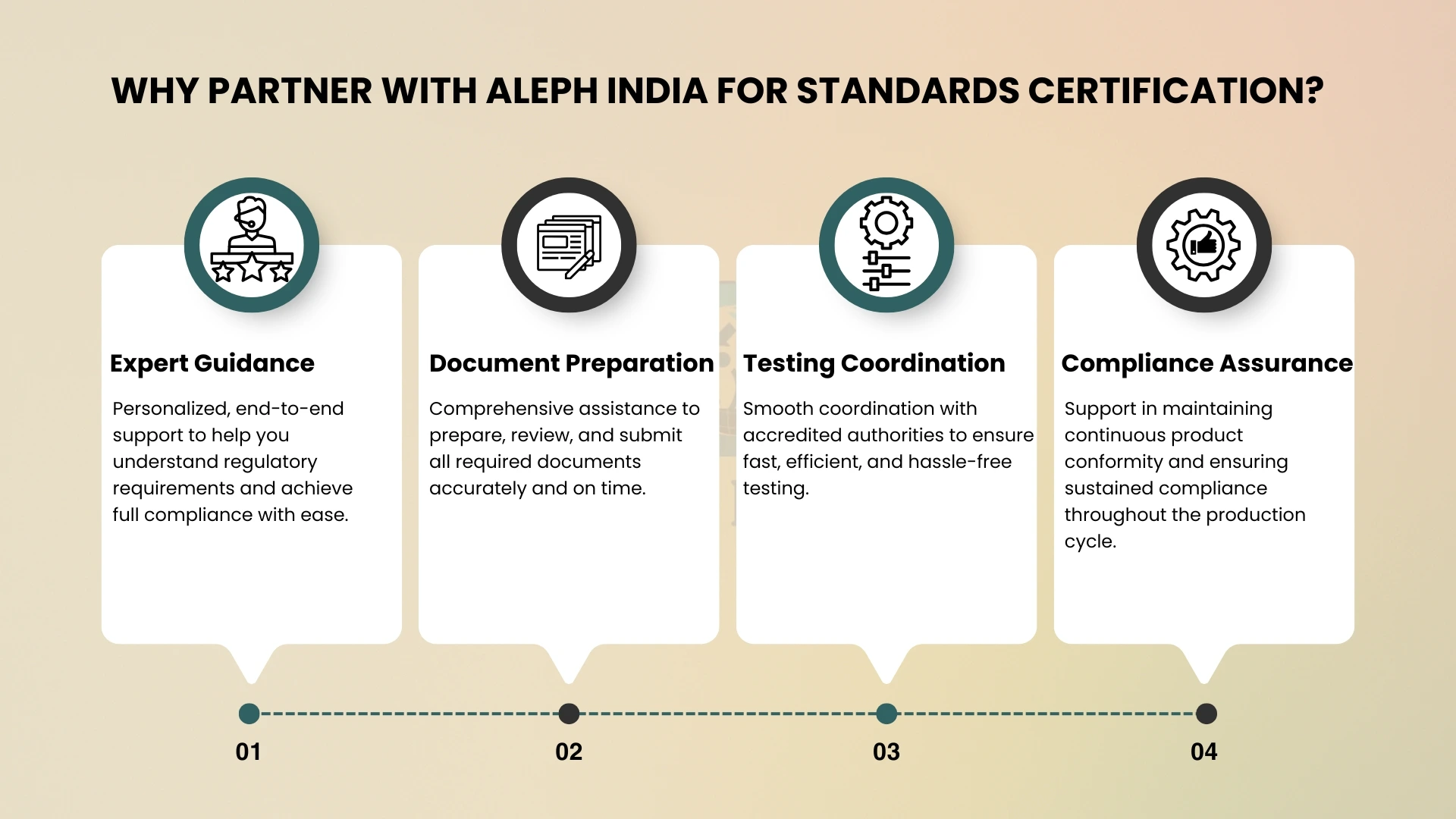The Saudi Standards, Metrology and Quality Organization (SASO) is the official technical authority in Saudi Arabia, established in 1972 to oversee all matters related to standards, metrology, and quality assurance within the Kingdom.
Saudi Arabia mandates that all consignments of regulated products entering the country must comply with the SASO Technical Regulations. Accordingly, exporters are required to obtain a SASO Certificate of Conformity (CoC) and a Shipment Certificate of Conformity (SCoC) for every consignment. These certificates serve as proof that the products meet the applicable Saudi standards and technical regulations.
Obtaining a SASO Certificate is not merely a recommendation—it is a legal requirement for exporting regulated products to Saudi Arabia. Without this certification, products are not permitted entry into the Kingdom. It confirms that the goods adhere to Saudi Arabia’s quality and safety standards.
Exporters often encounter customs inspection delays or shipment rejections due to missing or incorrect documentation. To prevent such issues, businesses must follow the correct certification procedures. This guide provides a detailed overview of the process, from registration on the SABER platform to final approval, with practical insights based on the experiences of exporters and trade partners within the Indian trade ecosystem.
The SASO Certificate of Conformity (CoC) is an official document verifying that exported products comply with the technical regulations and safety standards of Saudi Arabia. This certification is compulsory under the SALEEM program and is administered through the SABER online platform.
The SABER platform acts as a unified online system where importers and exporters must register their products and undergo conformity assessments. Without a valid Certificate of Conformity, products cannot be legally imported into Saudi Arabia.
The SASO regulations apply across multiple product categories, including electronics, cosmetics, building materials, automotive components, and more. The regulatory framework is designed to protect consumers, promote fair competition, and align with the objectives of Saudi Vision 2030, which prioritizes product safety, quality, and innovation.
Two Main Types of SABER Certificates
SABER is an online platform that connects importers, conformity assessment bodies, and Saudi Customs for the issuance of certificates for both products and shipments. Since January 1, 2019, it has been mandatory for importers to initiate certification requests through the SABER system before importing goods into Saudi Arabia. Every shipment destined for Saudi Arabia must be accompanied by a SABER Certificate of Conformity.
Two main certificates are issued through the SABER system to ensure product compliance with Saudi standards:
1. Product Certificate of Conformity (PCoC)
The PCoC certifies that a product meets the applicable Saudi technical regulations. It is specific to each product and remains valid for one year.
The certification process involves:
-
The importer registering the product on the SABER platform with all relevant details, including technical specifications and HS code.
- Selection of a SASO-authorised Conformity Assessment Body (CAB) to evaluate the product.
- Payment of the required fees, after which the CAB reviews the importer’s submission on SABER.
- The CAB guiding the exporter to provide supporting documents such as laboratory test reports and product drawings.
- Once the product meets all requirements, the CAB uploads the verified documents and issues the PCoC electronically through the SABER system.
2. Shipment Certificate of Conformity (SCoC)
The SCoC is required for each individual shipment and is directly linked to a valid PCoC. Without it, the shipment cannot clear Saudi customs.
The process includes:
-
The importer initiating a request for an SCoC in SABER for each regulated product being shipped.
- The CAB verifying the validity of the related PCoC.
- After confirming the documentation and product consistency, the CAB approves the application in SABER.
- Once the importer pays the applicable fees, the SCoC is issued electronically, valid only for that particular shipment.
Together, the PCoC and SCoC ensure that all products entering Saudi Arabia comply with national safety and quality standards under the SALEEM program.
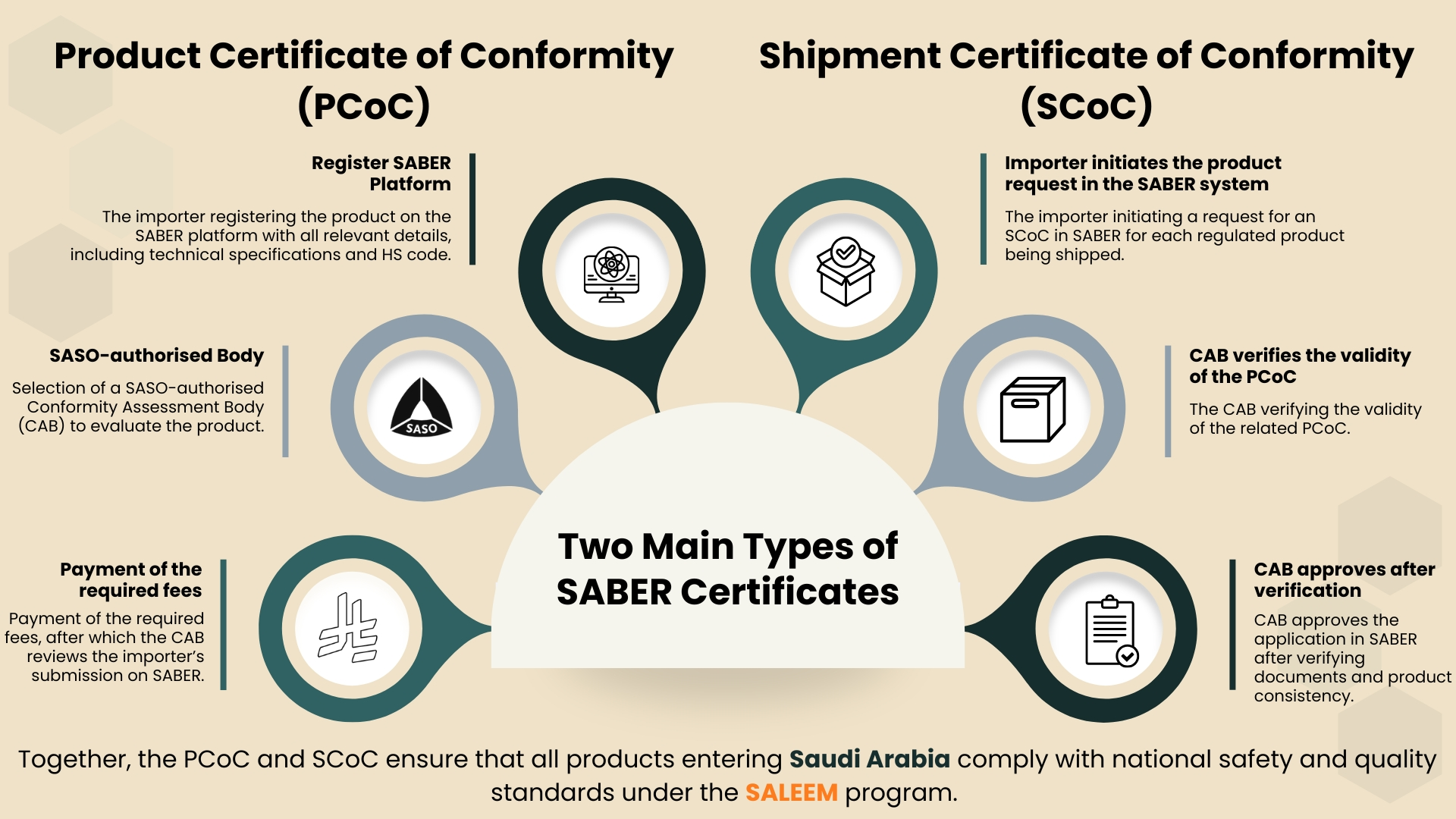
Role of SASO, SALEEM, and SABER
The Saudi Standards, Metrology and Quality Organization (SASO) was created to establish and enforce technical regulations and standards in Saudi Arabia.
To ensure product safety and compliance with these regulations, the SALEEM program serves as the conformity assessment system within SASO.
SASO has developed an online platform to facilitate this process. Through SABER, exporters and importers can register their products and submit documents.
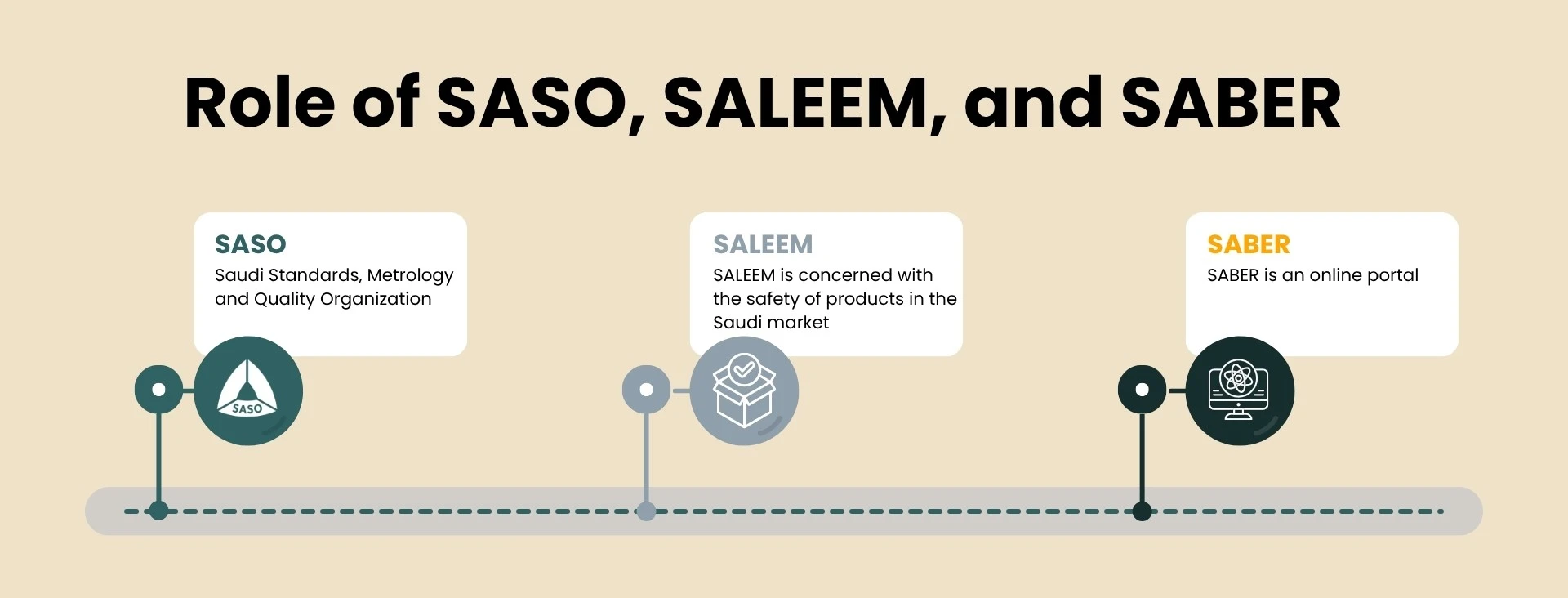
Step-by-Step Process to Obtain SASO Certification through SABER
Step 1: Register on SABER
The importer or authorized representative must create an account on the SABER platform. The importer's details and contact information are registered. Each product is then assigned its HS code, category (regulated or unregulated), technical specifications, and product photographs.
Step 2: Select a Certification Body (CAB)
For regulated products, the importer selects a SASO-approved Conformity Assessment Body (CAB) from a list available on SABER (e.g., SGS, QIMA, HQTS, Tabseer).
Step 3: Product Evaluation and Issuance of PCOC
The CAB reviews technical documents, laboratory test reports, and, if necessary, a factory audit.
If the product complies with the relevant SASO technical regulations, a Product Certificate of Conformity (PCOC) is issued.
This certificate is valid for one year and is electronically linked to the importer's SABER account.
Step 4: Request for Shipment Certificate (SCoC)
Before each shipment, the importer applies for a Shipment Certificate of Conformity (SCoC) using the existing PCoC. Required documents include a commercial invoice, packing list, and shipping documents.
For regulated products, SABER automatically forwards the request to the CAB for verification.
Step 5: Customs Clearance
Saudi Customs verifies the SCoC through the FASAH system. After verification, the shipment is cleared for entry into the Saudi market.
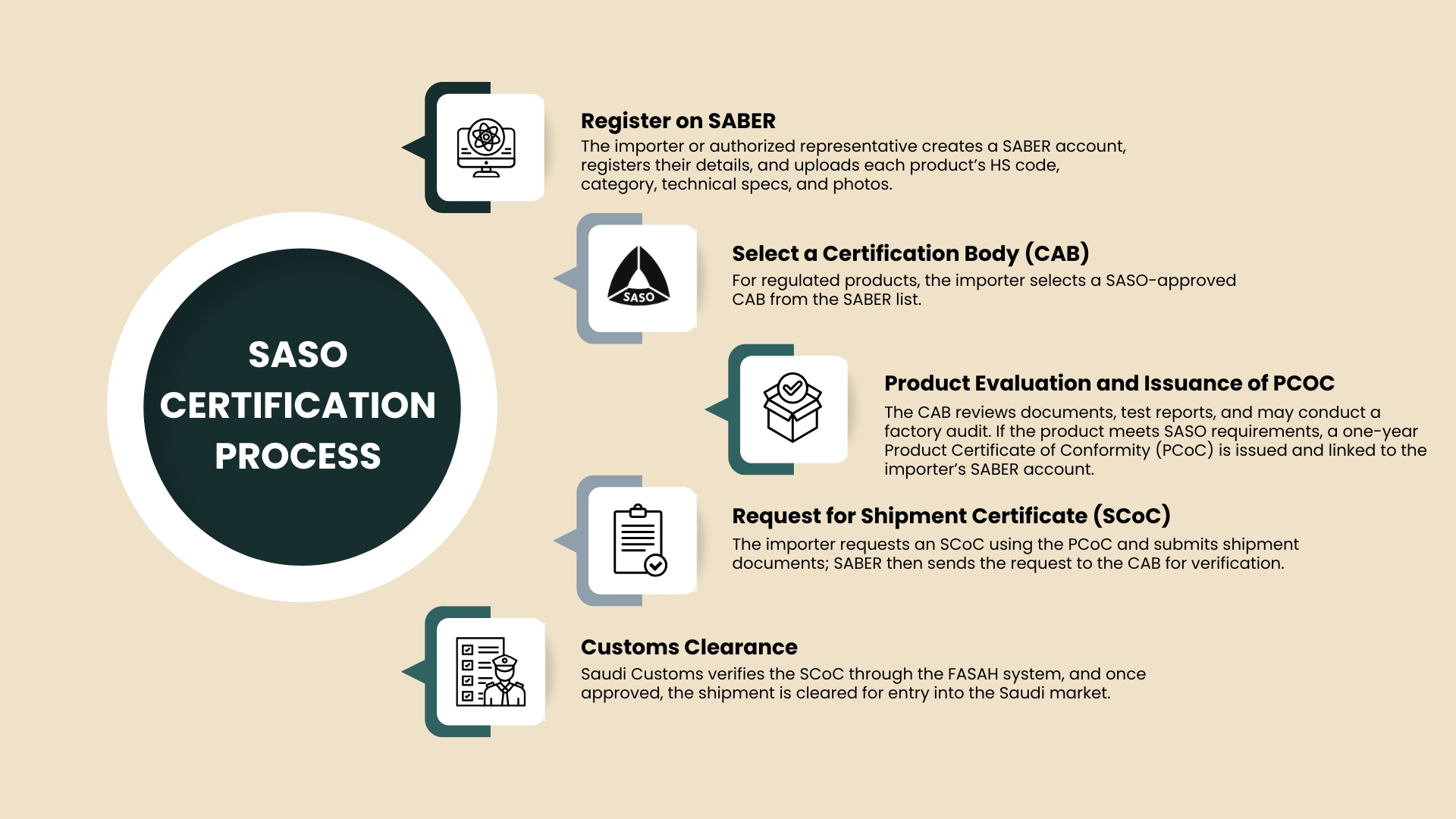
Required Documents for SASO Certification
- Commercial Invoice – Includes product details, value, and HS code.
- Packing List – Specifies weight, dimensions, and packaging information.
- Bill of Lading / Airway Bill – Serves as shipment proof.
- Certificate of Origin – Issued by the Chamber of Commerce to verify product origin.
- Test Reports – Must be from ISO/IEC 17025 accredited laboratories.
- Technical Data Sheet (TDS) – Provides detailed product specifications.
- Safety Data Sheet (SDS) – Required for chemical or hazardous products.
- Product Photographs – Clear images showing product, labels, and packaging.
- Declaration of Conformity (DoC) – Manufacturer’s statement of compliance with standards.
- Factory Audit Report – Needed for high-risk or specially regulated products.
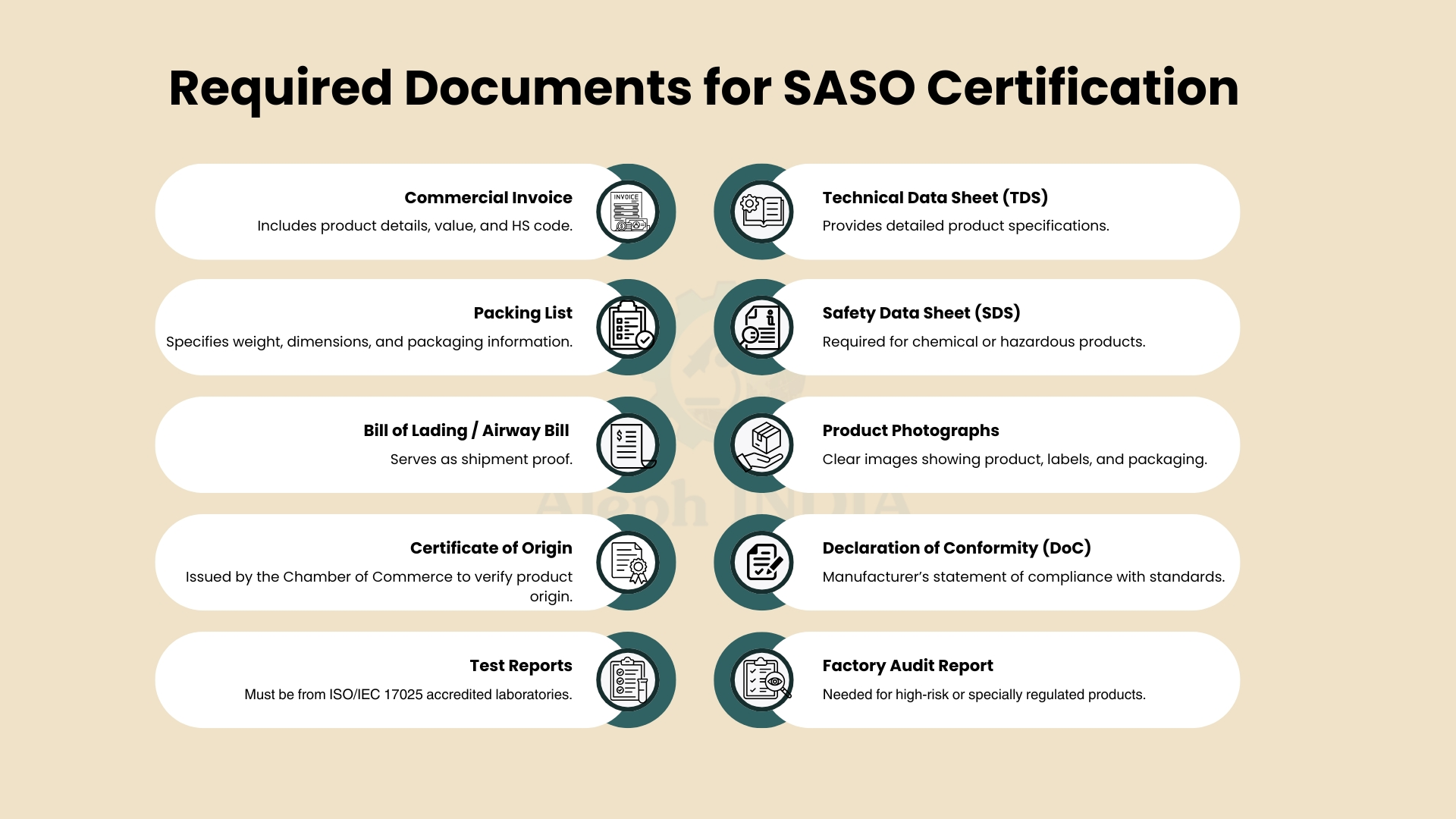
Validity and Renewal of SASO Certification
The SASO certification framework consists of a number of certificates, which expire and have to be renewed differently though. The Product Certificate of Conformity PCoC is valid for one year and can be renewed every year. The Shipment Certificate of Conformity SCoC is valid for a single consignment and expires upon clearance by the Saudi Customs. The product gets the certification for 3 years for companies with the SASO Quality Mark, as well as annual surveillance audits and regular reviews to confirm the consistency.
To continue to have access to the Saudi market, it is vital for businesses to remain current with SASO regulations and submit renewals or apply for new certificates when required.
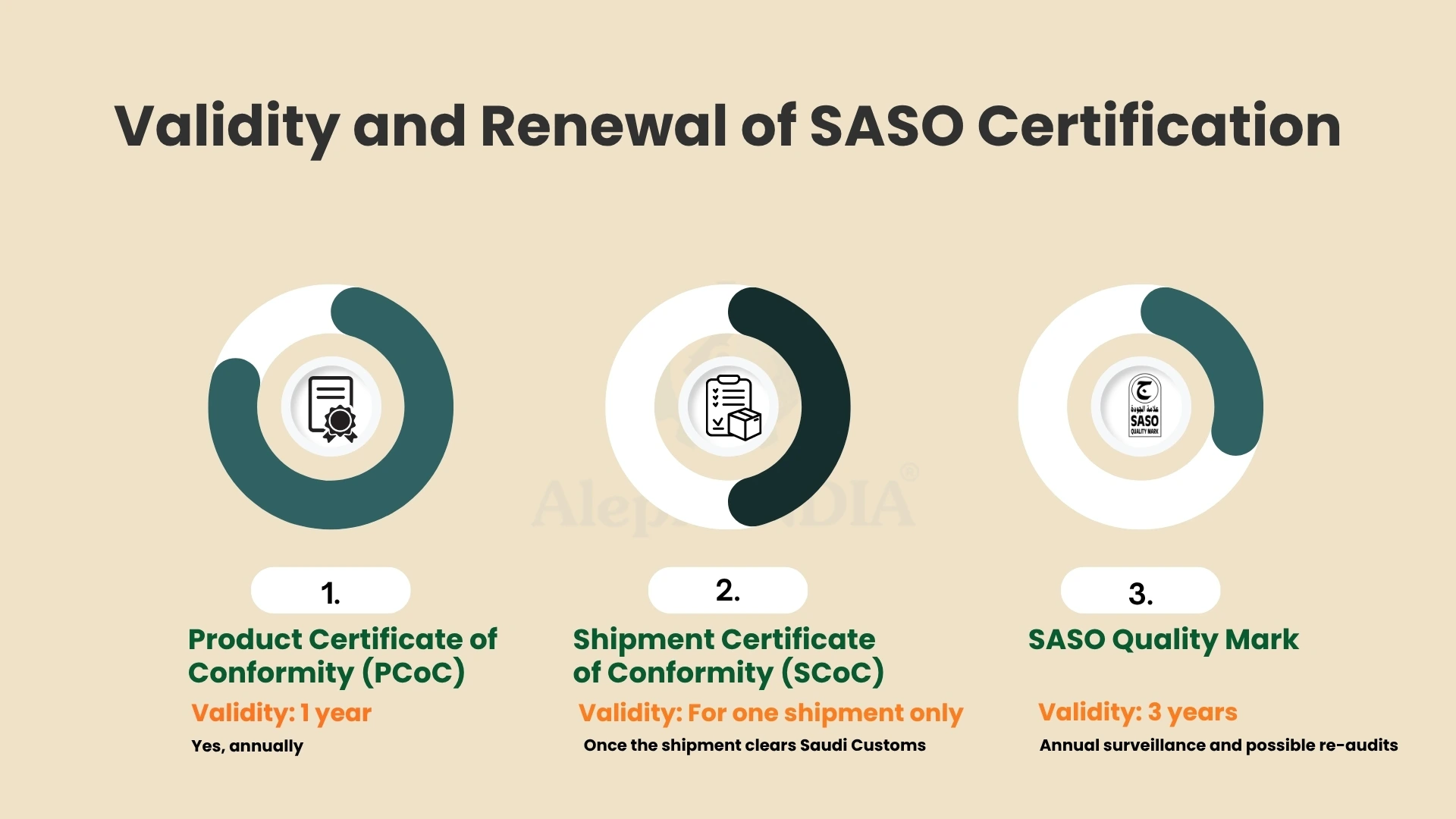
SASO Certification Consultant
SASO Certification, or rather the Saudi Arabia Technical Regulation and Metrology regulation is an absolutely necessity to establish the safety, quality and conformity for products being exported. As an export product and manufacturer, it is imperative for you to get your product registered. Products must be assessed to the relevant technical regulations in order to get a Product Certificate of Conformity (PCoC) and a Shipment Certificate of Conformity (SCoC), both required for Customs clearance.
By complying with SASO and SALEEM requirements, companies are able to prevent shipping delays, customs problems and market refusal of product. Accurate certification increases the trust of Saudi domestic buyers and importers – in the product itself, as well as within those supplying or stocking any form of ingredient.
Get in touch with Aleph India, the top SASO certification consultant to ease the entire certification process. Aleph India is a longstanding partner with more than 16 years of experience that give the expert SABER Services for product registration, testing documentation and approvals. With extensive expertise on International Laws & Standards, Aleph India provides end to end support to Manufacturers and Exporters planning to enter the market of Saudi Arabia without any hassle.
